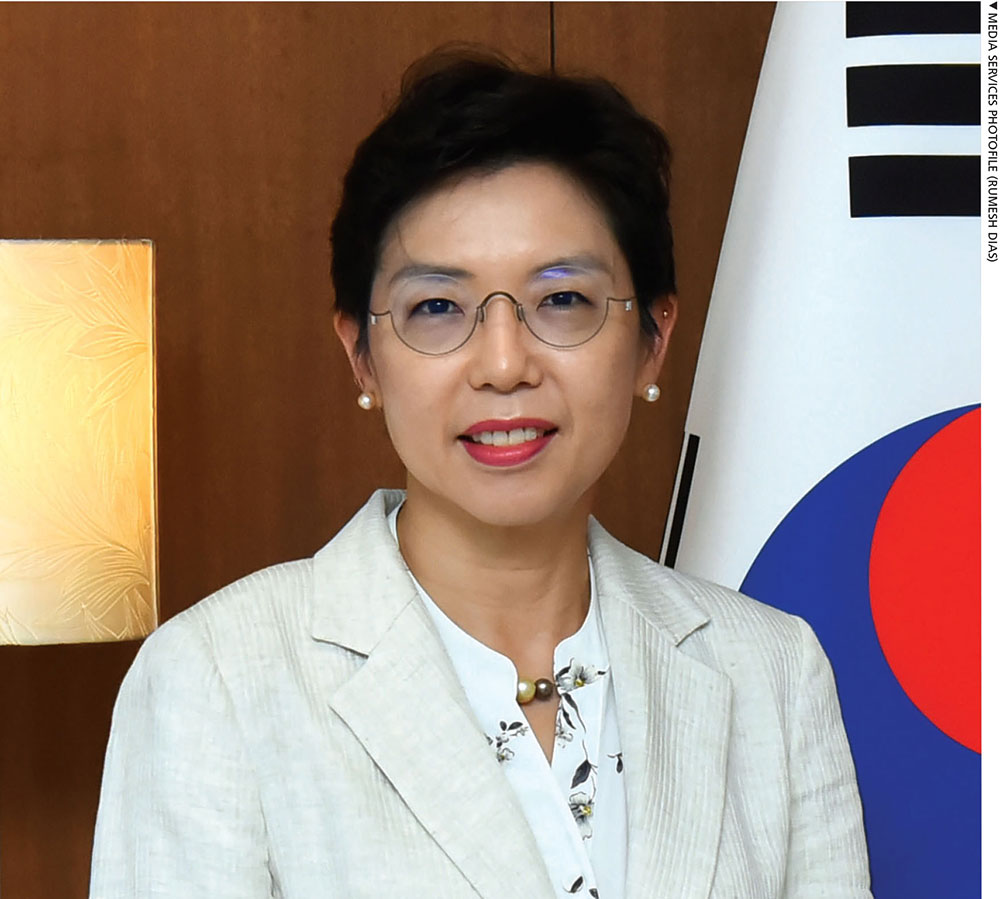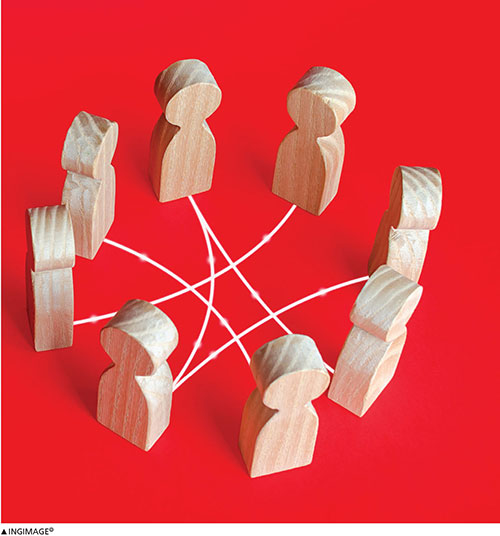THE FRIENDSHIP FUSION
Sri Lanka holds a strategic position geopolitically and economically
Ambassador of the Republic of Korea to Sri Lanka
Miyon Lee

Q: How would you describe bilateral relations between South Korea and Sri Lanka?
A: Bilateral relations between the two nations have flourished through high-level meetings, mutual international support, significant people to people exchanges and enhanced economic cooperation.
Marking the 47th anniversary of diplomatic relations this year, bilateral ties between South Korea and Sri Lanka reached new heights in various aspects.
Presidents Yoon Suk Yeol and Ranil Wickremesinghe met on the sidelines of the 78th session of the UN General Assembly last year, paving the way for strong economic ties and people to people exchanges.
The countries mutually support each other in international fora as well. Sri Lanka supported South Korea for a non-permanent member seat at the UN Security Council last year. Meanwhile, South Korea supported Sri Lanka at the UN Economic and Social Council election in June.
In terms of people to people exchanges, Sri Lankan workers dispatched to South Korea reached a total of 100,000, contributing to both countries’ economies.
However, I’d like to see more work done to boost trade and investment, and more active attraction of South Korean companies to Sri Lanka.
Q: What initiatives are in place to enhance cultural exchanges between our two nations?
A: It’s heartwarming to witness the enthusiasm among Sri Lankans (particularly the youth) for South Korean culture – for example, movies, dramas, food and music.
Our embassy hosts two major events in July: the Korean Ambassador’s Cup Taekwondo Championship final and K-POP World Festival in Sri Lanka, where Sri Lankans showcase their performances and skills.
The taekwondo demonstration team will visit Colombo in October and I’m excited to be able to introduce the essence of South Korea’s traditional martial arts.
In addition, the first Study in Korea education fair took place in June with around 30 South Korean universities participating both online and offline.
Alongside the fair, a K-street food booth was set up by a South Korean chef for participants to enjoy authentic Korean street food.

Q: How do you view Sri Lanka’s strategic importance in the Indian Ocean region?
A: Sri Lanka holds a strategic position geopolitically and economically. South Korea supports a free, peaceful and prosperous Indo-Pacific region, and Sri Lanka’s resilience and stability based on our 47 years of trust.
With the friendship of all and enmity towards none, Sri Lanka plays a critical role in the Indian Ocean region in facilitating regional security and economic integration.
Sri Lanka has demonstrated its ability to balance relations with neighbouring countries and global powers as the Indian Ocean Realm Association (IORA) chair.
Q: Could you elaborate on the programme to provide employment opportunities for Sri Lankans in South Korea?
A: SouthKorea operates its own foreign employment system – the Employment Permit System (EPS) – through which the government manages the process of selecting and dispatching unskilled foreign workers (E-9). Sri Lanka has been deploying workers since 2004 based on an intergovernmental MOU.
The EPS centre in Sri Lanka, which comes under the embassy’s purview, organises labour exchanges between the two nations. To work in South Korea through EPS, candidates must pass a Korean language test, a skill test, an interview and a medical checkup.
Meanwhile, the quota for Sri Lankan workers has been increasing annually. With this year’s overall E-9 quota at 165,000, Sri Lanka is expected to secure more than 8,000 jobs. Other categories include skilled (E-7) and seasonal labour (E-8).
Working with an E-7 visa requires meeting certain conditions such as having a master’s degree or over five years of related work experience. The seasonal labour category is under discussion.
Q: How does South Korea plan to support Sri Lanka in sectors such as education, healthcare, renewable energy, employment and agriculture, and rural development?
A: Our development agencies in Sri Lanka – KOICA (Korea International Cooperation Agency), KOFIH (Korea Foundation for International Healthcare), KOPIA (Korea Program on International Agriculture), Export-Import Bank of Korea (EXIM) and the Saemaul Foundation – have been working dynamically as one team to support the country across diverse sectors.
Our commitments in education, especially through KOICA and the Saemaul Foundation, span all levels. From providing smart classrooms for rural students to introducing new academic fields in major universities, we’re dedicated to enhancing educational opportunities.
Healthcare remains a top priority as demonstrated during the coronavirus pandemic and medical supply shortages. Last year, KOFIH established an office in Colombo to expand and strengthen its 15 years of assistance.
The Saemaul Foundation focusses on rural development in the spirit of the New Village Movement. It aims to establish a self-help system by improving agricultural production and income generation in underprivileged areas.
Also in agriculture, KOPIA is dedicated to developing and improving seeds tailored to the local environment.
In the energy sector, South Korea is implementing a floating solar project in the Uva Province and plans to set up Sri Lanka’s first energy storage system (ESS), which is essential for fully utilising its renewable energy portfolio.
Additionally, we provide EXIM bank loans for major energy and infrastructure projects. This is merely a glimpse into our ongoing initiatives.
FACT FILE
FAMILY
Husband
Son
Daughter
SCHOOLING
She followed her father who was also a diplomat and spent her junior years in the Ivory Coast
and US. She always missed her graduation ceremonies.
HIGHER EDUCATION
BA in East Asia History – Seoul National University
MSFS – Georgetown University
Q: If you could swap roles with a famous Sri Lankan personality for a day, who would it be?
A: I would love to be King Kashyapa (except for the patricide part), sitting on the throne at the top of the Sigiriya fortress, looking down at the vast terrain of jungles, mountains and marshes, enjoying the dancing muses.
Q: What’s the most unique cultural tradition you’ve observed in Sri Lanka?
A: A love for festivals, parties and gatherings with families and friends. That’s my source of happiness and resilience.
Q: If you could bring one aspect of South Korean culture to Sri Lanka and vice versa, what would they be?
A: BTS from South Korea and poya holidays from Sri Lanka.
Q: South Korea is known for its cuisine. How do you compare Korean food with Sri Lankan cuisine?
A: Given the difference in climates, ingredients like coconut, cinnamon and curry are rarely used in Korean dishes. But we’re both rice eaters and share a love for chillies (we call it kochu).
Q: What’s the most adventurous thing you’ve done while in Sri Lanka?
A: I hiked around Horton Plains without being bitten by leeches. My next goal is to climb Adam’s Peak.
Q: Your ‘guilty pleasure’ when it comes to media is…?
A: I love reading South Korean webtoons – they are in fact the original content for many famous Korean dramas and movies.
Website overseas.mofa.go.kr/lk-en/index.do | Instagram korembsl | X @korembsl
